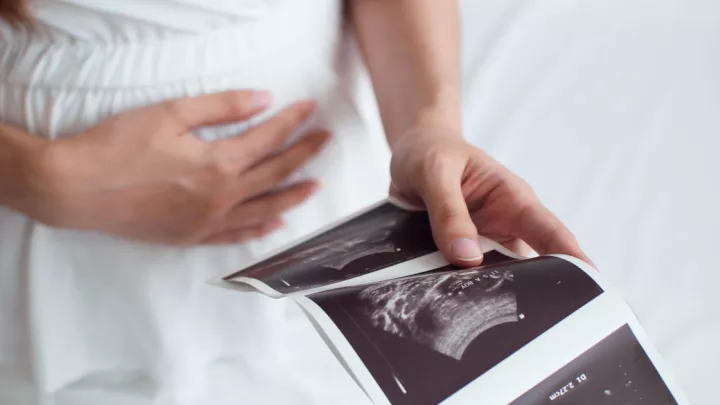Early pregnancy signs of concern

During early pregnancy, it can be challenging to distinguish between expected symptoms and those that may be warning signs, requiring a call to the doctor or a trip to the emergency room.
A pregnancy is considered early during the first trimester, which lasts 13 to 14 weeks. Awareness of potential complications and emergencies is crucial for seeking proper care at the right time.
What danger signs are considered an emergency?
Symptoms of an emergency (urgent maternal warning signs) should not be ignored. Get immediate medical attention if you have:
- Bleeding that soaks through a large pad in an hour or less.
- Sudden, severe abdominal pain.
- Dizziness, lightheadedness or nearly passing out.
- Nausea and vomiting with an inability to keep fluids or food down for 24 hours.
- Fever or extreme weakness that makes it hard to get out of bed.
What warning signs warrant a call to the doctor?
Call your doctor if you have any of these symptoms:
- Bleeding with a positive pregnancy test or minor bleeding.
- Pelvic pain, particularly if only on one side. Mild cramping can be expected as the uterus stretches and grows.
- Fever.
- Nausea and vomiting that makes it difficult to eat or drink, even with over-the-counter medications or at-home treatments like small, frequent meals and hydration.
What’s the difference between minor and heavy bleeding in early pregnancy?
- Minor bleeding refers to spotting or light bleeding, similar to a light period.
- Heavy bleeding means passing clots or soaking through a pad in an hour.
Implantation bleeding occurs when a fertilized egg implants in the uterine lining. This light spotting can range from pink-tinged discharge to light, bright red bleeding and typically doesn’t last more than a few days. If you’re unsure if bleeding is implantation, talk with your doctor about your symptoms.
What about miscarriage concerns in early pregnancy?
A miscarriage is the loss of a pregnancy during the first 20 weeks. It occurs in about 15% of known pregnancies, with 80% of cases happening within the first 12 weeks. Most miscarriages are the result of the body ending a pregnancy that would not have been able to survive until the baby is born.
“The most common reason for a miscarriage is a genetic abnormality with the embryo (50%),” says obstetrician and gynecologist Mary Kinyoun, MD. “This is completely beyond the control of the patient or her partner. A miscarriage is no one’s fault and is not something you can prevent.”
Dr. Kinyoun recommends considering doing a workup for recurrent pregnancy loss after two miscarriages in a row.
“This includes blood tests for antiphospholipid antibody syndrome, thyroid issues, diabetes, and karyotype (checking the patient’s chromosomes, as there is a rare condition called a Robertsonian Translocation that increases the risk of miscarriage). We would also offer a special ultrasound or a hysteroscopy. These tests help ensure the uterine cavity (womb) is normal.”
Read more about how to tell if a miscarriage may have occurred.
Becoming pregnant after miscarriage: How do I stop worrying?
It’s reassuring to know that most women who experience miscarriage go on to have successful pregnancies.
“Becoming pregnant after a miscarriage is very anxiety-provoking,” says Dr. Kinyoun. “But know that most people with a history of pregnancy loss will go on to have healthy, uncomplicated pregnancies.”
Nebraska Medicine offers increased patient monitoring through our Olson Center for Women's Health Early Pregnancy Assessment Clinic, which provides:
- Pregnancy hormone tracking (quantitative HCG).
- Early ultrasounds.
- More frequent visits if desired.
“This is often referred to as the TLC model of care, and there is some modest data that this may decrease the risk of pregnancy loss,” adds Dr. Kinyoun.
What to know about ectopic pregnancy
An ectopic pregnancy occurs when a fertilized egg (embryo) grows outside of the uterus. The most common ectopic pregnancies happen in the fallopian tube, but they can also rarely occur in the ovary, the abdomen, or the cervix.
“This type of pregnancy can cause life-threatening internal bleeding and unfortunately will not result in a live baby, typically requiring medication or surgical treatment,” adds Dr. Kinyoun. “About 2% of pregnancies are ectopic, but if you have pain or bleeding in early pregnancy, about 18% of the time, the pregnancy is ectopic. People with a history of ectopic pregnancy should be followed closely in subsequent pregnancies with serial HCG levels and early ultrasound.”
Common symptoms are vaginal bleeding and pelvic pain, often on one side. This pain can range from mild to very severe. People at increased risk include those with a history of:
- Ectopic pregnancy.
- Pelvic infections, including chlamydia, gonorrhea, or pelvic inflammatory disease.
- Tubal ligation or ruptured appendix.
- Tobacco use.
- Pregnancy with an intrauterine device (IUD) in place.
- In vitro fertilization (IVF) pregnancy.
Even low-risk, healthy patients can be affected by pregnancy loss and ectopic pregnancy. Be extra vigilant and watch for warning signs if you have a history. Seek care from a high-risk obstetrician early in pregnancy if you have a history of blood clots, diabetes, or high blood pressure.
Dr. Kinyoun warns about the use of free pregnancy ultrasounds. “It’s important to know that these facilities are not medical clinics that do not have the capabilities to properly monitor high-risk pregnancies or sufficiently rule out ectopic pregnancy because they do not run blood tests,” she says. “Many times, there are no medical providers on site. I encourage individuals with concerns about early pregnancy to contact our comprehensive obstetrics and gynecology professionals at the Olson Center. Our Early Pregnancy Assessment Clinic is designed to handle early pregnancy complications in an evidence-based manner.”
The Early Pregnancy Assessment Clinic provides urgent, comprehensive answers and focuses on providing care for all pregnant patients in the first trimester with pain, bleeding, or questions about pregnancy viability. Call 800.922.0000 to schedule an appointment.







